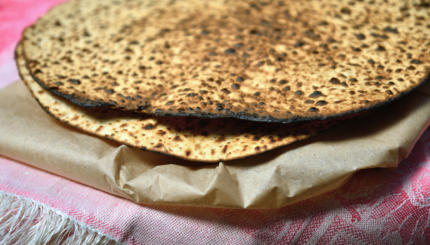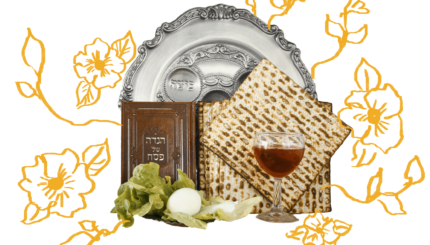What is the essence of Passover? On the one hand, it seems obvious: Passover is about gathering together with loved ones to recall, through sumptuous home rituals, the exodus from Egypt. We gather round our seder tables and quickly become engulfed in the warmth of family and friends, the culinary delights of a delicious meal, and the comforting, vaguely familiar words and songs we recite year after year. Passover is, indeed, a beautiful opportunity for rejoicing and celebrating. But it also can be much, much more.
When looking closely at the Passover Haggadah, we can see that the rabbis who crafted the did not choose to make Passover a holiday solely focused on celebrating the past. Like the 4th of July (or Hanukkah), Passover could have been a day to recall passively our independence from an oppressive regime as an historical remembrance; to commemorate the past and salute our Founding Fathers (or Maccabees). Instead, Moses (as Founding Father of the Israelites) is largely shut out of the — he appears but once. While remembrance of the exodus—from the enslavement of the Israelites to the ten plagues to the crossing of the Red Sea — forms a major portion of the content of the “Maggid” (Re-telling) section of the Haggadah, that remembrance is but a means to a larger ends. The end of the Maggid section reveals why:
In each and every generation people must regard themselves as though they personally left Egypt, as it says, “Tell your child on that very day: ‘This is what God did for me when I left Egypt.’” The Holy One of Blessing did not redeem only our ancestors, but God even redeemed us with them, as it says, “God brought us out of there in order to bring us to and gave us the land that God swore to our ancestors.”
The seder specifically, and Passover more broadly, are about remembering God’s deliverance of the Israelites not as a one-time, historical event but as something that is perpetually happening in the present. Redemption from slavery to freedom is intended to be an experience that we, too, can and should have during our seders. But why?
I believe that the seder is a literary means of experiential education. The Haggadah wants each of us to recall that we were once estranged, disenfranchised, and marginalized so that each of us will cultivate a sense of empathy for the estranged, the disenfranchised, and the marginalized in our society today. We honor our past by acting in our present!
READ: 5 Seder Supplements to Make Your Passover Relevant This Year
So as we get ready for Passover, cleansing our houses of hametz, preparing our Haggadah selections and invite lists, may we also take action to cleanse our society of poverty, bigotry, and hatred. As my colleague Abby Levine, director of the Jewish Social Justice Roundtable, recently wrote:
“There could not be a better moment to consider the intersections of Judaism and social justice than April 2016. Our world, our country, our community, is crying out for fairness and equity, in a multitude of ways. And Passover is just days away, the holiday when we retell the Exodus story and ask questions of freedom and liberation.”
Indeed, there has been an explosion of new and creative social justice-themed Haggadot and seder inserts created in recent years by Jewish organizations. This year alone, there are new additions about global justice (AJWS), LGBTQ rights (Keshet), hunger and military families (Mazon), wealth inequality (RRC), racial justice (RAC), mass incarceration (Truah), and refugees (Repair the World/HIAS), to name but a few. So please consider using any of these, tweet at #ActOnPassover, or make use of other resources that speak to you and help you concretize our ongoing mandate to seek out freedom and redemption for all of God’s children.
And may each of you be blessed with a happy, fulfilling, and meaningful Passover. Hag sameah (happy holiday)!



